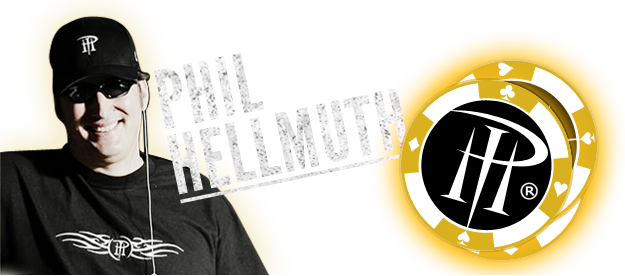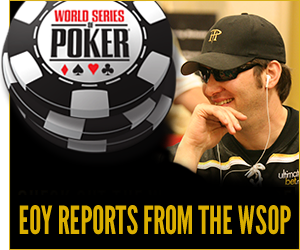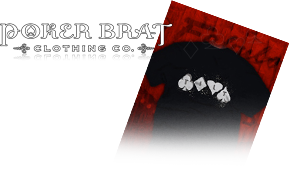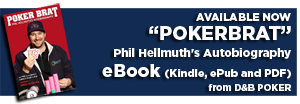-
Another Late-Night Poker Gambit
In these last two columns, I have featured a hand that I saw played on NBC’s “Poker after Dark.” Last week, it was Jennifer Harmon versus Eli Elezra, and this week it is a hand between Allen Cunningham and Phil Ivey. I watched “PAD” last week, and it featured Barry Greenstein, David Benyamine, Harmon, Ivey, Cunningham and Elezra. Usually the players buy-in for $20,000, with a first-place prize of $120,000; but in this case, it was a $60,000 buy-in, with a $360,000 first-place prize. I love watching “PAD!”
When this hand went down, Cunningham was the chip leader with $108,000, Ivey was in second place with $102,000, and they were playing four handed, as Harmon and Benyamine had already been eliminated. With the blinds at $2,000-$4,000, Cunningham opened for $10,000 with K-Q on the button. Ivey made it $30,000 to go from the small blind with A-6 off suit, and Greenstein folded A-J. Cunningham studied for a moment, both staring down Ivey for a few seconds and scratching his head, before saying, “I’ll go all-in.” Ivey then “insta-folded” his hand, and Greenstein said, “I was going to move all-in if Ivey called or folded.”
Here is my breakdown of the hand. Cunningham’s $10,000 opening bet with K-Q on the button was natural, although most players would have opened for $12,000 or $14,000 (a raise of about three times the big blind is the current standard). Ivey’s reraise was fine as well, and I liked the $30,000 number. Ivey also could have called or even folded his hand. Ideally, I would have liked to see Ivey stare down Cunningham for at least 10 seconds before he made his reraise. This would have accomplished a number of things. First, it would have allowed Ivey’s instincts a better chance to sort out whether A-6 had Cunningham beat or not. Second, it would have let Cunningham know that Ivey was paying close attention, and possibly caused Cunningham to fold his hand, which was the more natural play for Cunningham to make in this situation. And finally, it may have allowed Ivey to make a super-genius call with A-6 for his last $72,000.
Greenstein’s fold with A-J was pretty much mandated here, even though it turns out that he had the best hand. After all, it is pretty tough to move all-in with A-J when you’re staring down a raise and a reraise. Cunningham’s all-in move here was brilliant. He put it all on the line with this gambit, and he put tremendous pressure on Ivey. With this all-in, he forces Ivey to fold any small pair, any ace high other than A-J or higher and possibly forces Ivey to fold a medium to big pair, like 10-10, 9-9 or even J-J (although I think Ivey would have called with J-J). And let’s not forget that Cunningham also wins the pot if Ivey was bluffing. What was brilliant about Cunningham’s move? He correctly deduced that Ivey couldn’t call an all-in move.
If Ivey had A-K, A-Q, A-A, K-K, Q-Q or J-J, then I would criticize Cunningham’s move and say, “How could he risk it all there with K-Q?” But Ivey had A-6, and no-limit hold ’em is a game of reads, deduction and logic. Cunningham read that Ivey couldn’t call a reraise, and he acted accordingly, moving all-in. Ivey’s fold allowed Cunningham to win $34,000 (Ivey’s $30,000 raise and Greenstein’s $4,000 big blind) risk-free. One more reason that Cunningham could make that move is that he had a tight reputation that day: He was playing fewer hands than anyone else. In fact, Ivey couldn’t even imagine that Cunningham had K-Q, as evidenced by Ivey’s super-quick fold. I think that Ivey’s fold for $72,000 more was an easy and natural fold to make. Ivey would have had to make a “superstar” play to call there with A-6.
Why do I criticize the exact same move one time, and heap praise on it another time? Am I results-oriented? Partly, but I’m more “read-oriented.” If you read someone well, and act accordingly, most times it is a good move in my book.
If you read someone poorly, and act accordingly, most times (even if you get lucky and win the pot) it is a bad move in my book.Reading your opponent well gives you an opportunity to:
A) Make a great fold
B) Pick up chips “risk-free”
C) Make a great call.
D) All of the above.Answer: D
Related Posts
- Trust Your Instincts
- Sully’s Bad Beat – And His Cool Tattoo
- Shak Fires the Third Bullet
- Managing Fatigue Reduces Bad Reads, Sloppy Bets, and Losses
- Hello, Old Friend
- At Bay 101, a Bad Play and a Bad Beat
- All Poker All the Time
- LA Story: And Then There Were Six
- Good Read, Bad Outcome
- Youth is Served — With a “False Tell”
Recent Posts
- WSOPE 2nd place finish
- Update from this years WSOP 2019
- Happy Holidays! Updated stock at Poker Brat, new book!
- Phil Hellmuth wins historic 15th World Championship!
- Final golden ticket winner coming soon
- Poker Brat – The Phil Hellmuth Jr. Autobiography
- Phil Hellmuth’s “Pokerbrat” – Coming soon to audio book!
- Poker Night in America – Sugar House Casino
- Sugar House w Matt Glantz
- Lost and found
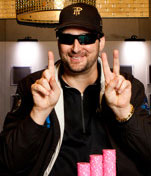
 ™
™



